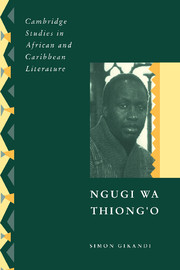Book contents
- Frontmatter
- Contents
- Preface
- Chronology
- 1 Introduction: reading texts and contexts
- 2 Narrative and nationalist desire: early short stories and The River Between
- 3 Educating colonial subjects: the “emergency stories” and Weep Not, Child
- 4 Representing decolonization: A Grain of Wheat
- 5 The poetics of cultural production: the later short stories and Petals of Blood
- 6 Performance and power: the plays
- 7 The prisonhouse of culture: Detained and Devil on the Cross
- 8 The work of art in exile: Matigari
- 9 Writing freedom: essays and criticism
- Conclusion
- Notes
- Bibliography
- Index
3 - Educating colonial subjects: the “emergency stories” and Weep Not, Child
Published online by Cambridge University Press: 09 February 2010
- Frontmatter
- Contents
- Preface
- Chronology
- 1 Introduction: reading texts and contexts
- 2 Narrative and nationalist desire: early short stories and The River Between
- 3 Educating colonial subjects: the “emergency stories” and Weep Not, Child
- 4 Representing decolonization: A Grain of Wheat
- 5 The poetics of cultural production: the later short stories and Petals of Blood
- 6 Performance and power: the plays
- 7 The prisonhouse of culture: Detained and Devil on the Cross
- 8 The work of art in exile: Matigari
- 9 Writing freedom: essays and criticism
- Conclusion
- Notes
- Bibliography
- Index
Summary
Ngugi's early stories and novels were written in the shadow of colonial rule in its most violent form – the state of emergency declared in Kenya by the British government on October 20,1952. The years in which Ngugi was educated and came of age (1952–62) were some of the most difficult and traumatic in his country's history. Apart from the state of emergency that had been imposed by the government in an attempt to repress a nationalist movement that had taken up arms to press its political demands, relationships between the colonizer and the colonized, social classes, families, and institutions, were conducted through modes of unprecedented violence. Kenya thus became a classical example of a political situation in which, to use Fanon's memorable term, violence comes to rule “over the ordering of the colonial world.” This is how the theme of violence came to enter Ngugi's early works. This violence can, indeed, be read as the primary mediator of Ngugi's relationship with his colonial situation, the dominant theme in his early works, and the central trope in his tortured struggle to come to terms with his past.
Later in his writing career, after reading Fanon's treatise on violence as a weapon of decolonization, Ngugi would come to interpret the state of emergency in Kenya as the highest point of African resistance against British imperialism. His main argument was that since colonialism had instituted violence as an instrument of conquest and rule, the colonized had no option but to adopt it as the first step in “deciding to embody history” and thus to break down the system of European rule.
- Type
- Chapter
- Information
- Ngugi wa Thiong'o , pp. 71 - 97Publisher: Cambridge University PressPrint publication year: 2000



